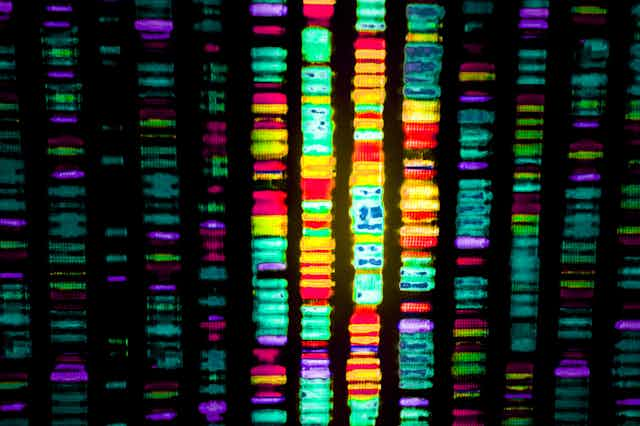Would you want to know if you were at a higher risk of getting dementia later in life? Would you want to know that you could die under general anaesthesia, or might die suddenly of heart failure? Would you want to know if you had a higher-than-normal chance of getting cancer? You could learn these things by looking at your genome. But would you want to be faced with the answers?
Your genome is the complete set of genetic information in the cells of your body. It is like a recipe book that provides the instructions for who you are, and the recipes are your genes. Each gene provides a set of instructions for the protein molecules that make up your body. Much like how your cake recipe might differ from your neighbour’s, these genetic recipes can differ slightly from person to person. However, if there is a significant error in the recipe – for example, if baking powder were left out – this can have a damaging effect on the final product. So, if there is a harmful variant in a gene, this can affect the protein produced, which can cause genetic disease.
When a doctor suspects that you have a genetic disease, they can now read your genome from cover to cover. After nearly 13 years of international collaboration, the first complete sequence of the human genome was unveiled in 2003. Since then, the cost of genome sequencing has dropped from £1 billion to less than £1,000 allowing genome sequencing to enter routine clinical care, and transforming the way we diagnose and treat disease.
NHS England is currently sequencing 100,000 genomes, and the US has plans to sequence 1m genomes. A 2015 study predicted that up to two billion people worldwide could have their genomes sequenced within the next decade – comparable to the reach of the internet. With so many genomes getting sequenced, and increasing opportunities to get genetic information outside of the healthcare system, you could be next.
What can I learn from my genome?
Genetic variants help shape who we are and can tell us a lot about ourselves. This ranges from rather harmless characteristics – such as eye colour – to potentially serious conditions. These include findings for which there is no treatment, such as genetic changes associated with an increased risk of Alzheimer’s, as well as medically actionable findings, such as genetic predispositions to breast cancer where screening and treatment is available. One to two per cent of people who undergo genome sequencing could have genetic changes that point to these serious but medically actionable conditions.
Sometimes, in genetic testing for one condition, we can find variants that point to other serious diseases. For example, genome sequencing of a patient with a heart condition could flag up an additional genetic variant associated with cancer. However, much of our understanding of these genetic variants comes from patients who have the associated disease, so we can safely assume that the genetic variant is at fault. But with more and more data, we are learning that more people have disease-causing variants than we expect to have the disease – which means that simply carrying a variant doesn’t necessarily mean disease will follow. So for this patient with a heart condition, interpreting variants that point to any other disease, such as cancer, is challenging.
There are other issues to consider. How would you feel if you were told you had a 90% increased risk of breast cancer or that you might die suddenly from a problem with your heart like some young athletes in the news? Even if our ability to understand these variants were stronger, would the benefit of knowing this information outweigh the potential anxiety it could cause?
Genetic variants aren’t the full picture – the environment plays a role, too. There are also concerns around storage, security, privacy and discrimination. Further complicating all of this is the shared nature of genetic information. We share half of our genome with our parents, children and siblings, one quarter with our grandparents, aunts, uncles, nieces and nephews. Unlike a typical medical test, genetic results not only affect us, but our family members.
Your genome, your choice
In the coming years, as these large genome sequencing projects are completed, our understanding of these variants will improve and policy will catch up with the technology. In the meantime, genome sequencing programmes – including our own – are offering these results to participants, generating the data needed to inform our understanding of these variants. These results, however, are optional: it is your choice whether or not you want them. So, before you provide a saliva sample to have your own genetic recipe book read, it’s important to know which results are worth knowing about.

